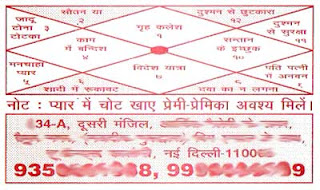"What is your good name?" A question which many of us would have answered innumerable times during our growing years. The emphasis was on the 'good.' It gave us the impression that our other name(s) - nicknames, pet names - fell in the 'bad name' category. Therefore we took extra precautions against the revelation of our not-so-good names to our classmates. With those who stayed close enough to know us by our pet names, it was a fair trade. You don't utter mine and I too will keep yours a secret.
The deal usually worked only with those who spoke in Bangla at home. Others usually gave a damn about our deals and naturally turned into blackmailers. They without any alternative names, or with 'fancy' ones like Vicky, Rocky, Munna (Anil Kapoor's character in Tezaab came to their aid) or Jackie, didn't have anything to hide. About the girls we didn't care much; it was still a couple more years to go to know their worth.
Long ago, more than a year to be precise, my brother had forwarded me a mail. Many of you would have it in your inboxes. It is also there at a couple of places online. But it makes for a wonderful read, therefore couldn't resist posting it here. Hope you will sympathise with our kind.
To all the Choton, Gul-Gul, Khoka, Laltu, Gogol, Tutu, Bubu, Khokon, Bhonda... et al
This post is part of an ongoing series. In these pages, I will attempt to alert people to a great injustice that is being perpetrated upon the sons of Bengal. So you thought they were wimpy to begin with. Far from it, my friend. Their current state is a result of years of conditioning by the oppressors - namely the women. By using a variety of psychological weapons, they have reduced these fine men to what you see today.
Today we focus on the first weapon in their hands - the NICK-NAME.
When a son is born into a Bengali household, he is gifted with a resonant, sonorous name. Bengali names are wonderful things. They convey majesty and power. A man with a name like Prasenjit, Arunabha or Sukanta is a man who will walk with his head held high, knowing that the world expects great deeds from him, which was why they bestowed the title that is his name upon him.
But it simply will not do for these men to get ahead of themselves. Their swelling confidence needs to be shattered. How can one go about it? This task is left to the mothers of these lads and is accomplished by the simple act of referring to the boy, not by his fine-sounding real name, but by a nickname which Shakti Kapoor would be ashamed to answer to.
Their are some rules for creating nicknames, which need to be followed. They are -nicknames must have no connection to the real name. "Arunabha" cannot be called "Arun". No, for that would be logical, and such things are anathema in the world of women. Instead he shall be called "Bhombol". If possible, the nickname and real name must have no letters in common, but an ancient alphabet proves to be the constraining factor there.
Nicknames must be humiliating. If you are a tall strapping boy, with a flair for soccer, an easy charm and an endearing personality, then you shall be nicknamed - "Bhondu". And every time, you have set your sights on a girl, and are on the verge of having the aforementioned lass eat out of your hand - your mother will arrive & pronounce loudly - "Bhondu" - Bari eso (come home). The ensuing sea of giggles will drown out whatever confidence you had earned from that last winning free-kick.
A nickname must refer in some way to a suitably embarrassing incident in your childhood that you would give your arm and leg to forget. If it took you a little too long to shed your baby fat, then years of gymming will not rid you of the nomenclature - "Motka". If your face turned crimson when you cried as a toddler, you will be called "Laltu". When you turn 40, your friends' children will call you "Laltu Uncle". Even age will not earn you the right to be taken seriously thereafter.
Different members of the family will make up different nicknames - each more embarrassing than the preceding one. If one member of the family calls you Piklu, then another will call you Mitul, and another will call you Jumbo. The humiliation multiplies.
You will always be introduced by your nickname, until people forget you had a Real Name. Ranajoy might have taken on a gang of armed men single-handedly, but Toton really didn't have a chance. After a point Toton will completely take over the beaten body of Ranajoy, weighed down by the pressure of a thousand taunts.
This strategy is surprisingly effective. Ask yourself - would you take Professor 'Rintu' seriously? Or put much weight by the opinion of Dr. 'Bubai'? Or march into battle under the command of General 'Thobla'?
The power of the nickname has scarred the psyche of Bengali men everywhere. It follows them like a monkey on their backs. That too, a monkey with a flair for slapstick, that was gifted to them by their own mothers.
That, dear Bong friends, is Step No.1 of their grand plan. I must leave now before they realise I am telling you all this. Now let me make my escape. But wait! There's no way we can let you go now - you've seen too much. Not before you answer the question...
"Tomar daak naam ki, Khoka?" (What's your pet name, kiddo?)
Google search tells me that at least one Professor Rintu exists.
If anyone knows who the original author of the piece is, please let me know.
[Translations in brackets are my additions]
Update [October 8, 2006]
The original post is here (Thanks TM).
And my mail didn't have the concluding paragraph:
But wait! There's no way we can let you go now - you've seen too much. Not before you answer the question... "Tomar daaknaam ki, khoka? (What's your pet name, kiddo?)"
The crowd waits with bated breath in anticipation of the great warrior being hoisted by his own petard. They lick their chops hungrily. But tonight is not their night. He stands tall and straight and a smug smile plays on his lips. From his lips come the words -
"Mazhi aai Bangali nahee" (I'm not a Bong - in Marathi). And he survives to fight another day.
And this was TM's comment on the original piece:
What about the man whose mother said to a leading Bengali newspaper- "Babloo phone kore bollo: Ma, Aami Nobel peyechhi". Even a Nobel prize won't help you live that down!
Click here for the complete post...
Collapse this post

















 This ad has been viewed almost 7.5 lakh times on YouTube (and has also been flagged an inappropriate for minors by some users, therefore you need to log in to view it there).
This ad has been viewed almost 7.5 lakh times on YouTube (and has also been flagged an inappropriate for minors by some users, therefore you need to log in to view it there).



































